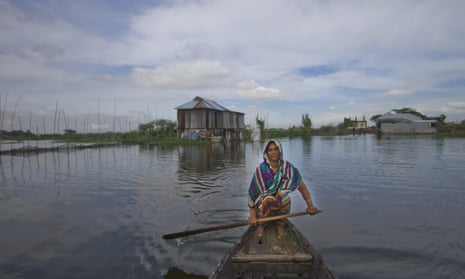The $10bn (£6bn) in climate aid which Britain and other rich countries are expected to formally pledge this week represents a backsliding on earlier climate finance transfers, according to observers.
Countries are together expected to offer around $10bn to the Green Climate Fund (GCF) at a meeting in Berlin on Thursday, with the UK becoming one of the world’s largest contributors with an expected pledge of about $1bn.
The $10bn total figure is at the bottom end of the $10-15bn target set by the UN last year for countries to meet before next month’s UN climate summit in Lima, Peru.
“We are not applauding the announcements [of pledges] yet,” said Meena Raman, an official observer on the GCF board, representing civil society from developing countries. “The devil will be in the details of these contributions – whether they come with conditions; whether they are grants or loans; and whether the amounts are earmarked for specific purposes.”
The contributions, which include $3bn from the US and $1.5bn from Japan, are to be spread over four years and could be a third lower a year than was pledged for developing countries at the UN climate summit in Cancun in 2010.
“It appears that the current pledges ... will be close to $10bn and for the four year period of 2015-2018. This is really not much given the scale of the challenge. In 2009 the [fast track] funds were supposed to be $30bn for three years (2010-2012) – or $10bn a year. $10bn over four years for the GCF is actually a backsliding of efforts,” said Raman.
The GCF, a new UN institution expected to start disbursing money next year, will channel it primarily from developed to developing countries to help them adapt their cities and farming to the more severe floods, heatwaves and sea level rises that are being experienced with climate change, as well as cut their emissions.
It is expected to be the world’s premier international climate fund, with a goal of making at least $100bn available a year by 2020. This is seen as the minimum amount of money that over 150 developing countries will need to avoid the worst effects of climate change.
Control of the fund is already proving highly contentious. Developing countries are concerned that in GCF board meetings rich countries have fought to be able to target their contributions to the fund’s private sector facility, which could help their own big corporations to profit from “green” investments in developing countries.
Developed countries have also wanted board-voting to be linked to contributions in the event of a lack of consensus in decision-making. This, say poor countries, would make the GCF similar to the World Bank which is widely seen to favour the interests of rich countries.
Other concerns are that rich countries will seek to direct most money to reduce emissions rather than help poorer countries adapt to climate change.
“The GCF is starting to look like a credible multilateral bank. But it needs to be hugely expanded,” said Kevin Watkins, director of the Overseas Development Institute (ODI), the UK’s leading independent thinktank on international development.
“There’s a tension here between mitigation and adaptation. There are a large number of low income countries who will [shortly] be dealing with serious adaptation issues. There is a risk that mitigation could trump adaptation, and push out the world’s poorest countries,” he said.
Many G20 countries including the UK, Saudi Arabia and Italy have yet to pledge money but observers are pleased that developing countries, including Mexico ($10m), South Korea ($100m) and Indonesia ($200,000) have offered money to the fund.
With finance one of the keys to a successful climate deal in 2015, developing countries also want assurances that any money pledged will be newand additional, as the UN wants, and not recycled from existing aid budgets. The UK’s contribution will come from its International Climate Fund which it set up in 2012 to provide £3.87bn between April 2011 and March 2016. The US contribution is $1bn higher than the previous US commitment of $2bn but it is unclear whether the funding will have to be approved by the US Congress.
Some GCF climate finance trackers are now far more optimistic that a global climate deal will be reached at a climate summit in Paris in 2015.
“These pledges bring us a giant step closer to reaching a global climate agreement in Paris. These financial commitments send a strong signal that countries are willing to step up to the plate at home and abroad to curb emissions and help communities prepare for the consequences of climate change,” said Athena Ballesteros, finance centre director of the World Resources Institute.
But others questioned the scale of the pledges. “US military spending topped $575bn last year alone. While it’s welcome, a White House pledge of $3bn over four years to climate security is a drop in the bucket by comparison,” said Janet Redman, climate policy programme director at the Washington-based Institute for Policy Studies.

Comments (…)
Sign in or create your Guardian account to join the discussion